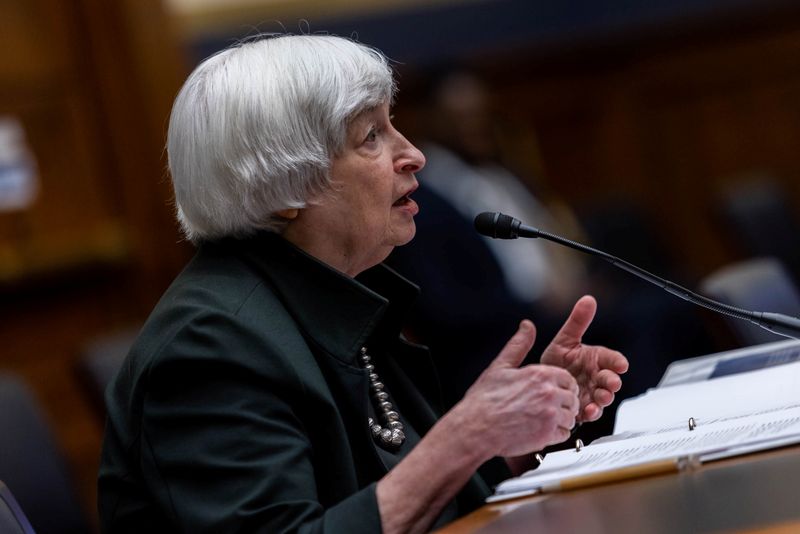By David Lawder
WASHINGTON (Reuters) -Top U.S. regulators on Friday proposed new rules to speed the assessment of financial stability risks and make it easier to designate non-bank institutions as systemically important, subjecting them to Federal Reserve supervision.
The multi-regulator Financial Stability Oversight Council released the proposals for public comment just over a month after two regional bank failures sparked the biggest financial system contagion threat since the 2008 financial crisis.
U.S. Treasury Secretary Janet Yellen has raised concerns about non-bank financial institutions, including hedge funds, because of their lack of supervision and the potential for systemic spillovers from firms in distress.
Revisions to guidance on branding such firms as systemically important reverse some aspects of Trump-era changes in 2019 that made such designations more difficult.
Yellen said the new guidance removes some "inappropriate hurdles" to designating non-bank firms, causing the process to take up to six years.
"That is an unrealistic timeline that could prevent the Council from acting to address an emerging risk to financial stability before it’s too late," she said in remarks to the FSOC meeting she chaired on Friday.
The new guidance drops 2019 requirements that FSOC assess the likelihood of a firm's financial distress, apply an "activities-based approach" and conduct a cost benefit analysis prior to designation -- which National Credit Union Administration Chair Todd described as a "Rube Goldberg-like process."
These will be replaced with a quantitative and qualitative analysis process under which the council determines whether "material financial distress at the company or the company's activities could pose a threat to U.S. financial stability," a Treasury official told reporters, adding that it was not a complete return to 2012 guidance.
The revised designation process also allows for ample engagement between regulators and a company under review, officials said.
Federal Reserve Chairman Jerome Powell told the meeting: "Overall, I believe that the changes proposed by the Council will create a balanced approach to addressing potential risks to U.S. financial stability and ensure that all the tools available to the FSOC will remain on equal footing."
NOT US
Hedge fund, mutual fund and asset manager trade groups responded by saying that regulators should look elsewhere for threats to financial stability.
"We know that designation of a registered fund or fund manager would be the wrong answer," Eric Pan, CEO of the Investment Company Institute said in a statement.
"FSOC should avoid concluding that entity designation and the application of bank prudential regulatory tools is the right way to carry out its mission to mitigate risks arising from asset management.
The Securities Industry and Financial Markets Association's Asset Management Group said that because asset managers are directed by their clients and hold small balance sheets, they should not be designated.
The group added that the reversal of Trump-era guidance "is concerning."
RISKS, VULNERABILITIES
FSOC's proposed new risk assessment framework aims to enhance the council's ability to address financial stability risks by reviewing a broad range of asset classes, institutions and activities, according to a Treasury fact sheet.

These include markets for debt, loans, short-term funds equities, digital assets and derivatives; counterparties, payment and clearing systems; and financial entities including banking institutions, broker dealers, asset managers, investment firms, insurers, and mortgage originators and services.
The new framework also specifies vulnerabilities that FSOC and member regulators would consider when evaluating potential stability risks. These include leverage, liquidity risk and maturity mismatches, market interconnections and concentration, operation risks and risk management activities.